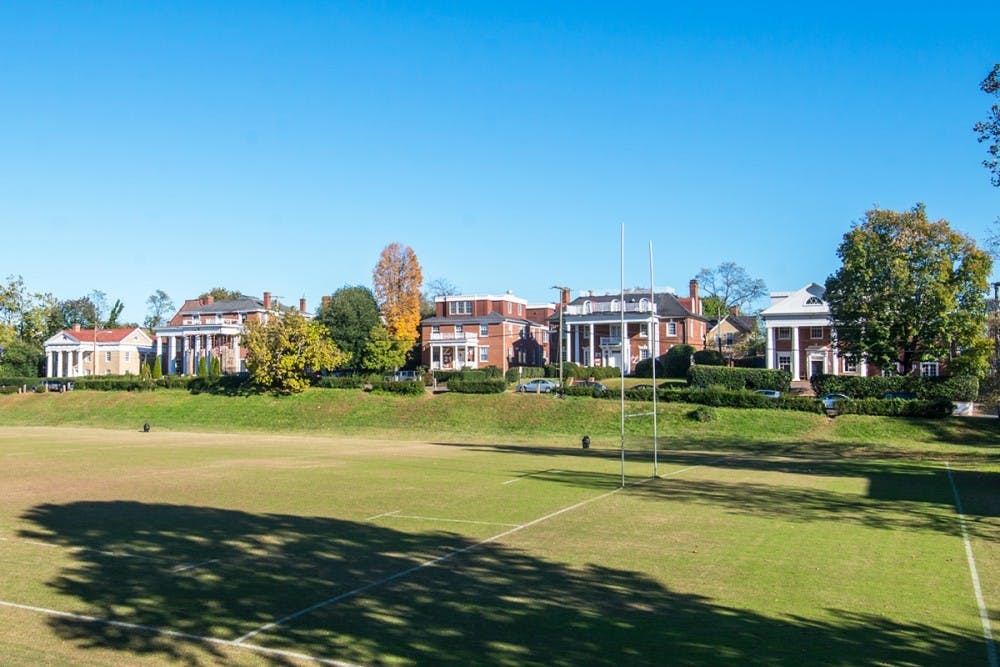Lea en español
The Inter-Fraternity Council and Inter-Sorority Council released a joint statement Wednesday to suspend all in-person activities this semester — including formal and informal gatherings such as parties and meetings. The statement included a warning that offending chapters could face a Fraternal Organization Agreement suspension for the academic year. This comes after fraternities and sororities came under scrutiny in the spring and summer for hosting gatherings during which attendees did not adhere to social distancing or the University’s mask policy.
“We are making this decision in the interest of protecting the public health of the University and greater Charlottesville community,” the statement read.
The ban on in-person gatherings does not include housing and dining arrangements, however.
Katrina Hall, president of the ISC and a fourth-year Nursing student, shared that in order to protect the health of the University and Charlottesville community, the suspension of in-person activity had to be done.
“Simply put, this was the best decision we could make in the interest of protecting the health of the community,” Hall said. “With U.Va. on the verge of welcoming back students, it's important that the IFC/ISC takes their role in preventing the spread of COVID-19 seriously. Suspending all in-person events until further notice is the right thing to do in order to help keep people safe this fall."
As of Thursday, the University’s COVID-19 tracker reports 67 total cases among students, faculty and staff since Aug. 17, 40 of which are among students alone. Of the 40 student cases, 23 were reported Thursday, the highest single-day spike since Aug. 17. Eight positive test results were reported Wednesday.
Kyle Riopelle, IFC president and fourth-year College student, agreed with Hall’s sentiments, saying that the IFC and ISC’s course of action was “the right thing to do.”
“We know that every individual and organization will have to do their part this semester to ensure the health and safety of the Charlottesville community — after lots of thought, leaders across the IFC and ISC agreed that suspending our in-person activity was the best way to do our part,” Riopelle said.
Clare Scully, vice president of finance for the ISC and a third-year Commerce student, emphasized that the instructions given to sororities will ensure the containment of COVID-19. Scully noted that the ISC worked alongside the IFC to draft a pledge that all fraternities and sororities would sign to ensure that they will live in accordance with safety measures to stop the spread.
In addition to this pledge, presidents of chapter houses will meet to develop a COVID-19 Risk Management Plan with a Peer Health Educators — a group of trained University students who teach other students about health and wellness. Part of this will involve a log for guests that enter a house to aid in contact tracing, in case members have come in contact with a coronavirus carrier. Houses are also encouraged to designate a sick room for members that test positive to isolate themselves. Generally, sorority and fraternity houses have anywhere from 15 to 35 students living in each house a year.
Similar to the University itself, all measures that the IFC and ISC develop are done to protect both its members and the surrounding community, Scully said. However, since Greek houses are located off-Grounds and are not on University property, enforcement of safety protocols is largely at the discretion of the Greek councils rather than the University.
“The Inter-Sorority Council is striving to mitigate the risks that students face living in the chapter house through providing ample health and safety resources,” Scully said. “It is our hope that this community-wide agreement of standards prioritizes the safety of our community this fall and serves as tangible guidelines to hold each other equally accountable.”
Students living in Greek houses who test positive for COVID-19 — or have been exposed to someone who tested positive — are told to self-quarantine or isolate within their housing units.







